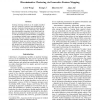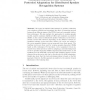140 search results - page 7 / 28 » On using Articulatory Features for Discriminative Speaker Ad... |
NOLISP
2005
Springer
14 years 1 months ago
2005
Springer
The best performing systems in the area of automatic speaker recognition have focused on using short-term, low-level acoustic information, such as sepstral features. Recently, vari...
INFORMATICALT
2010
13 years 6 months ago
2010
Abstract. New text independent speaker identification method is presented. Phase spectrum of allpole linear prediction (LP) model is used to derive the speech features. The featur...
AVBPA
2003
Springer
14 years 26 days ago
2003
Springer
Abstract. Weighted distance measure and discriminative training are two different approaches to enhance VQ-based solutions for speaker identification. To account for varying import...
AAAI
2012
11 years 10 months ago
2012
Existing clustering methods can be roughly classified into two categories: generative and discriminative approaches. Generative clustering aims to explain the data and thus is ad...
ICBA
2004
Springer
14 years 1 months ago
2004
Springer
We apply the ETSI’s DSR standard to speaker verification over telephone networks and investigate the effect of extracting spectral features from different stages of the ETSI�...


